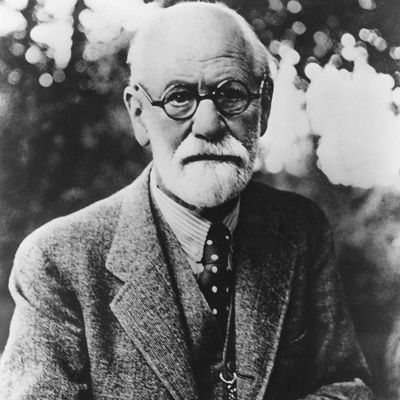
Here’s a fun Freud fact: Ol’ Sigmund, that lover of the phallic symbol, smoked a reported 20 cigars a day for years, leading to 34 (!) surgeries, the removal of his jaw, and his eventual death by euthanasia. Another fun Freud fact is that he thought he gave humanity a Third Unpleasant Truth: Copernicus told man (always man, back then) that Earth was not the center of the Universe; Darwin that man was merely an animal; and Freud that the conscious mind was only the tip of the psychic iceberg; we’re really controlled by the unconscious. Which leads us to a third fun Freud fact: though he’s been largely dismissed as an intellectually fearsome but empirically irresponsible wackadoodle, he may have been startlingly accurate about how the mind really works.
As you may recall, Freud divided the psyche into the ego, id, and superego. If you’re feeling fancy, call it the Freudian Triumvirate (and it’s important to note that the best rap albums combine all three). The id is the “most primitive psychic agency,” as University of Notre Dame psychologist Daniel K. Lapsley termed it, and as such it’s where your drives — often sexual —push your behavior toward pleasure. The ego is the “executive,” he writes, since it conforms the desires of the id with the vagaries of reality, and thus it’s where reasoning takes place (and also, in typically Freudian terming, the repression of desire). The superego, then, is the land of the “ideal” — where your senses of duty, censorship, and justice are expressed, imprinted by your parents and culture. Fascinatingly enough, as Olivia Goldhill notes at Quartz, contemporary psychology is finding lots of parallels.
Axel Cleeremans, a cognitive psychologist at the Free University of Brussels, explained as much in a recent lecture at the annual Association for the Scientific Study of Consciousness conference. He is quoted as saying:
“The ‘id’ is what we call the unconscious today or the idea that there’s a vast reservoir of representations that sits there and influences ongoing processing but without being available to conscious awareness … The ‘super-ego’ in a sense is connected with meta-cognition, with the idea that in addition to first-order awareness, the technical movie that we have as soon as we wake up and the field of sensations we experience and thoughts we have, there’s an additional monitoring and control system.”
What’s especially interesting here is the metacognition and superego link. Metacognition, or the awareness that you have of your own mental events, has been found to have a role in many of the ways we think and behave (and think about behaving!). People who multitask more are worse — but more confident — drivers, because they have less metacognition available (with less available to notice mistakes, their assessment is that they’re doing great). Conversely, one of the things that happens with ongoing mindfulness meditation practice is that you actually train your metacognition (and attention) by spending all that time acknowledging your thoughts. As Harvard neuroscientist Sara Lazar once told me, the attention training helps you stay focused, and the metacognition helps you see the “minimally conscious” stuff happening in your mind. “You think, this is boring, but what else is happening? You start to notice little thoughts and feelings happening in the back,” she said. “They’re happening all the time, and we miss them 80 percent or 90 percent of the time. You notice there’s a lot more going on that you never saw before.”
It makes a lot of sense when you think about it: If we take the superego to be a “psychic agency” that’s most concerned with Doing What Is Right, then the more that you’re aware of the events happening in your mind, the more dutiful you’ll be able to behave. This appears to be the mechanics for why mindfulness meditation has so long been touted as a training in compassion. In multiple experiments, people who had taken an eight-week introductory meditation course were more than twice as likely than a control group to offer their seat to a confederate wearing one of those huge boots associated with healing a broken foot. Put another way, the stronger your metacognition is, the more your superego can act through you. Freud would be proud.

